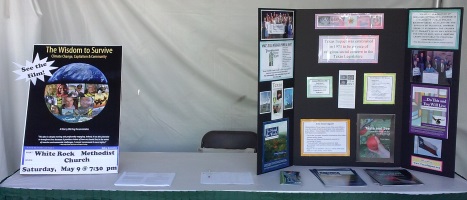
A disturbing thing happened at Earth Day Texas - racists and nativists showed up masquerading as environmentalists. A tweet from the Southern Poverty Law Center alerted me that anti-immigrant groups with white supremacist ties would be out at Earth Day Texas. Seeing one of their (unmanned) booths was, therefore, not a surprise. But being verbally accosted at my own booth was.
Toward the end of the last day of the festival (Apr 26), a gentleman approached the Dallas Interfaith Power & Light booth and engaged in conversation. From the start it was apparent that he was coming with an agenda — but we couldn’t complain, since clearly we too had an agenda. He agreed that anthropogenic climate change is a legitimate global problem. That’s a fine start. Then he asks: what do you think is the cause? Response: over consumption of our resources, particularly in wealthy countries.
No — it’s overpopulation, he says. He proceeds to lay out a brief statement, and asks me to acknowledge that overpopulation is the root cause. Response: no, I still hold that our human nature toward overconsumption is the root cause, not population itself. “THAT’S COGNITIVE DISSONANCE” he all but shouts. “… those people… in Africa and Haiti… all of your efforts are meaningless until we reduce their fertility rates.”
Yes, it was all about “those people.” Classic racist words — and only the first in a string of overtly racist statements. Somewhere in there were words about immigrants to the U.S. and their impact both on the environment, and on our educational system (Chinese students “taking too many” slots at our great American universities). My colleague, Cheryl Clark — who had been valiantly trying to steer the conversation in a positive direction — finally asked to end the conversation not long after the assertion that “blacks and Latinos don’t like to use condoms” (he “knows” because he has “asked them”).
The argument that each American consumes far more than any individual in a developing nation held no significance for him, because he claimed that taken as a whole Africa is (or would be soon) out consuming Europe. The Global Footprint Network’s findings disagree: Africa as a whole consumes 1.0 global hectare per person, compared to 4.1 in the EU. Despite having 38% of Africa’s total population, that works out to the EU consuming about 160% more than Africa, overall*.
Let’s be fair: the syllogism that more people means more consumption means more environmental problem is indisputable when discussing business as usual. That is, under our dominant ways of life today, continued population growth must inevitably lead to severe environmental problems. And we don’t like to talk about it, because too many people like this guy have historically cloaked their racist views in pseudo/scientific assessments. Most environmentalists are sensitive to the problems of eugenics, sterilization, and forced “family planning” without real autonomy and personal choice. So we avoid the subject.
My aim is not to vilify, but rather to expose. Long-time environmentalists are likely thoroughly familiar with this debate. But younger Gen X’ers like me, and millennials, may not have run across this issue so much. We need to be aware of this history. There are plenty of well-meaning people who can talk seriously about over-population. Let us not deny the legitimate discussion.
What I really want to urge is that we turn this conversation around. Rather than talk about how “those people” need to stop having so many children, can we talk about the factors such as education, economics, and functional governance, that just so happen to influence fertility rates? And while we’re doing so, can we talk about the massive over consumption and materialism of the industrialized world — the issue that is really at the root of climate change?
Footprint analysis based on data from the Global Footprint Network. These data are © Global Footprint Network 2016. National Footprint Accounts, 2016 Edition. Licensed and provided solely for non-commercial informational purposes. Contact Global Footprint Network at www.footprintnetwork.org to obtain more information or obtain rights to use this and/or other data.
Posted with : Social Discourse, Nature, Sustainability, Environment, Wildlife, Climate Change, Inclusion and Anti-Racism